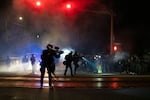
Police confront protesters during a demonstration in Portland, Ore., Sept. 5, 2020. Portland City Council has voted to limit authority of city police officers with federal deputations.
Jonathan Levinson / OPB
Portland City Council unanimously voted to place new limits on federally deputized city police Wednesday, barring officers from taking orders from federal law enforcement or making arrests under federal law.
The U.S. Department of Justice federally deputized 56 police ahead of a far-right rally in September, saying the deputations were necessary to better protect local officers as they policed what was expected to be a volatile demonstration. Unbeknownst to the entire City Council, the deputations were set to last until the end of the year. The DOJ has refused to end the deputations over the city’s objections. The city has since sued the federal government, arguing the extended deputations amount to illegal overreach into local policing matters.
Portland Mayor Ted Wheeler, who is the police commissioner, has also barred these officers from making arrests under federal law. With Election Day around the corner, concerns have lingered around local officers patrolling the demonstrations with the federal government insisting the officers can make arrests under federal law.
The Council unanimously passed a resolution Wednesday, crafted by Commissioner Jo Ann Hardesty, that would place a new set of restrictions on the officers.
“The entire City Council is united in saying we don’t have any police officers working on behalf of the federal government,” Hardesty said.
Hardesty’s resolution reinforces the mayor’s attempt to nullify the effects of the deputation. Wheeler had previously issued an order “to take no further action of any kind pursuant to the federal deputation.” Hardesty’s resolution similarly forbids officers from making arrests under federal law. It also bans the deputized Portland police officers from taking orders related to demonstrations or crowd control from a federal official or federally deputized state official.
The resolution makes an exception if Gov. Kate Brown takes control of PPB as she did during September’s far-right rally. In this case, local police would be able to take commands from deputized law enforcement. The resolution would also order deputized police to report any order handed down to them by a federal official or deputized state official to be reported to the City Council.
The mayor supported Hardesty’s resolution, though he seemed to think it wouldn’t make a difference in how protests are policed on the ground.
“I’m not sure that this resolution necessarily adds anything of import to the discussion except that I will absolutely support it because I believe the more we say uniformly that it’s a decision that we need to make here locally,” Wheeler said. “It’s a decision that needs to be made with elected officials being in the loop.”
Hardesty’s office invited two civil rights advocates to speak at Wednesday’s Council meeting: Andrea Valderrama, policy director for Oregon’s chapter of the ACLU, and Franz Bruggemeier, a staff attorney with the Oregon Justice Resource Center. Both urged the city to go further with limitations placed on the 56 officers.
“While we support this resolution, there are areas where we would have liked to see it go further,” said Valderrama, adding she would have liked to see the Council ban deputized officers from communicating with ICE, CPB and DHS agents without permission. She said she’d also like to see the officers removed from protests while the deputation remained in effect.
Hardesty said she too would have liked to see the officers pulled from patrol, but was advised against the move.
“I wish we could in fact put those officers on desk duty until their deputation was done then that would be my preference,” she said. “I also wish we could have made this resolution stronger but again due to legal advice we tried to walk a very fine line.”
The resolution codifies the mayor’s earlier direction to police to effectively act as if the deputations aren’t in effect. Still, it may not deter federal prosecutors from bringing federal charges as the DOJ insists the deputations are still in effect. Despite the mayor’s previous direction, the U.S. attorney’s office for Oregon announced earlier this week a teenager from Hillsboro would face federal charges for allegedly assaulting a deputized Portland police officer.
